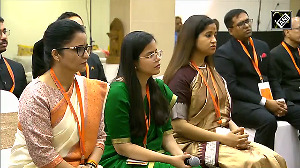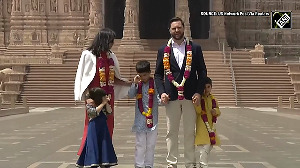Part I: Your time starts NOW
So, you've short-listed programmes, taken exams, filled out applications and gained admission at the shool of your choice. You're finished, right? Wrong!
Today, we'll look at what you must do in the final six months before your course begins.
Quarter Three: March, April, May
Planning for visa interview:
Once a university has determined that your application is complete and that you are academically eligible, it will issue an I-20 form to enable you to apply for your student visa. In this phase, there are two critical matters to look at, both of which need careful planning: financial documentation and the visa interview itself.
The three primary provisions to fulfill when applying for a student visa (F1):
- Your sponsor is financially sound to pay for your tuition and living expenses in USA
- You are not a potential immigrant to the US and have family and financial ties to India
- You are a sincere and genuine student
Financial capacity
Financial capacity is judged by the consulate officers in the American embassy in terms of liquidity in bank accounts, savings and investments, and other moveable financial assets. It is imperative to project either your or your sponsor's financial data in easily readable formats and worksheets, to enable the visa officer to decipher the necessary information. Each worksheet must be accompanied with the appropriate financial document in original or true copy.
Ties to home country
Your family and financial ties to India can be demonstrated through evidence that can include, but is not limited to: ownership of property, proof of immediate family that is still based in India, evidence of a mortgage payment, a letter from a future employer stating that you have a job offer upon returning home.
Sincere student
Your sincerity and genuineness as a student can be illustrated by articulately answering questions that probe why you chose the particular university; what are your academic and career objectives; why did you choose to pursue your education in US and how the degree programme is going to advance your career.
Booking a visa interview date
I20 form of your chosen University will state the reporting date, which is the latest by which you are required to reach US and register on the campus. You can book a visa interview date 90 days in advance of this reporting date. It is wise to have all financial documentation absolutely in order, well in time to take advantage of the 90 day margin. Considering that most universities will commence their classes in August, it is ideal to schedule your visa interview in May.
A few steps of the process:
Step 1 (Pay the fee): You must pay the application fee ($100) and VFS service charge at a designated branch of HDFC bank before applying for a visa.
Step 2 (SEVIS charges): You must pay the SEVIS fee on https://www.fmjfee.com/. If your University has made this payment on behalf of the applicant, the confirmation information must be produced at the time of interview.
Step 3 (Schedule an interview): Log on to the web site https://www.vfs-usa.co.in/ and click on the Apply for a Non-immigrant Visa link once the fees are paid. You will need to use the barcode number from your HDFC bank fee receipt in order to schedule an appointment. You will be required to fill the forms DS-156 and DS-157 and DS-158 (if applicable) at that time. You will have to wait 48 hours after paying the fee before you can book an appointment.
Step 4 (Report for the interview): Report to the US embassy or consulate where your appointment for a visa interview is scheduled.
Note that visa interview dates are difficult to find due to heavy rush of applicants. This makes it imperative to schedule a date early on, when they are easily available.
Quarter Four: June, July, Aug
Pre-departure preparation
Once you are granted visa, your passport will arrive at your residence between three and five working days and you can now begin pre-departure preparations. Things to keep in mind during this phase are:
Documents
You must compile and take along with you to the US legal, academic and health documents. These include
- A passport with at least six months validity beyond your entry date and SEVIS Fee receipt
- The Arrival-Departure Record (I-94 form) and Customs Declaration Form (CF-6059) to be submitted on arrival in USA
- Certificates of immunisation and vaccination. Most universities require proof of immunity to measles, mumps, and rubella. Many universities also need either a recent (within six months to one yearr) PPD skin test or chest x-ray to rule out tuberculosis infection.
Make sure that all immunisations are recorded on the yellow card of the World Health Organization (WHO), which is available from doctors/ public health service in India.
Academic documents that you must carry with you are official transcripts from secondary schools or colleges, syllabi, catalogs, bulletins, course descriptions, or other relevant materials issued by the school or college in India that you have attended most recently. These records can be very helpful to the admissions office and academic departments if questions arise concerning academic credit.
Financial issues and bank arrangements
Expenses to be made prior to flying to US and on arrival in US range from tuition fees and living expenses, (mentioned on your I-20), to transportation, books and supplies, communication (Phone), travelling and personal expenses of clothing, etc. Make sure you budget for these expenses and arrange for your finances accordingly.
Before you travel to US, contact a bank with a foreign exchange department, to learn the current exchange rate and the likely degree of fluctuation. This will help you to determine more effectively your financial requirements while in the US. Also find out how you can have additional money sent to you while you are in the US. The safest way to transfer funds from India to US is electronically.
You will also need to purchase foreign currency ahead of time for travel purposes and to pay for expenses that you are likely to incur immediately upon arrival in US, such as travelling, food, temporary accommodation, etc. You can take this foreign currency in a combination of cash and travellers checks. Also, get yourself an international credit/debit card.
Insurance
Since US does not have a government medical plan or health care service that covers international students, you will have to acquire private health insurance. If the university that you are going to attend does not offer a health insurance plan, it is extremely important that you obtain insurance coverage of your own to protect yourself against potentially very high medical costs in the US.
Make sure that your policy covers all major types of insurance coverage that you will need: travel insurance to cover you during your journey from your home country to the United States; life insurance insures your life; personal belongings insurance insures those items you bring to the United States with you against loss, theft, or damage; automobile insurance to cover your automobile and injuries to persons in the event of an accident; and health insurance to cover medical expenses.
Travel gear
Before you pack your bags, don't forget to check the weather and temperature of the State/City that your university is located in! As the weather in US fluctuates widely between northern, southern, coastal and central regions, make sure you pack clothes accordingly. Make a checklist of all personal items and necessities such as your medicines, toiletries, etc.
That's all and you will be ready to kick-start a new an exciting life as a student in USA!
Manisha is Joint Managing Director at Career Mosaic Pvt. Ltd







 © 2025
© 2025